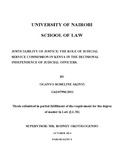| dc.description.abstract | Supply chain management (SCM) encompasses all activities involved in the
transformation of goods from the raw materials stage to the final stage when the goods
and services reach the end customer. Supply chain management involves planning, design
and control of flow of material, information and finance along the supply chain to deliver
superior value to the end customer in an effective and efficient manner. Traditionally,
firms have focused their energies on three main functions: purchasing, manufacturing and
distribution. Transport and storage activities within individual functions and across
functions have not received adequate attention, and have usually been handled by the
department managing the logistical aspects of the company. To gain insights into the
institutional set up of SCM arrangements, different theories have been developed that are
useful in structuring and analyzing management decisions in supply chains. The study
was carried out on Equator Bottlers Limited Kenya, a franchise of the Coca-Cola
Company, located in Kisumu. The study objectives included: establishing the supply
chain management practices at EBL Kenya, challenges faced by EBL Kenya while
implementing its supply chain management strategies and measures of supply chain
management successfulness. The research design adopted by the study was a case study
which involved an examination of the supply chain management practices at EBL Kenya.
A case study was chosen as this enabled the researcher to have an in depth understanding
of the company. Primary data was collected using interview guides. The interviewee’s
were the various departmental heads. Interview guides were developed from literature as
well as adopted from previous studies. Data collected that was purely qualitative in nature
was analyzed using content analysis. The study established that the supply chain
management practices adopted by EBL Kenya included; warehousing, inventory control,
timeliness of delivery, frequent contact with supply chain members and highly integrated
information system throughout the supply chain. The study also established that the
supply chain management challenges faced by the company included; poor fleet
management, poor motor vehicle maintenance, rising operating costs and lack of
performance measurements in supply chain. From the discussions and conclusions, the
study recommends that the concept of supply chain management should be thoroughly
addressed by EBL Kenya in order to reduce the supply chain management challenges
faced by the company. | en_US |

